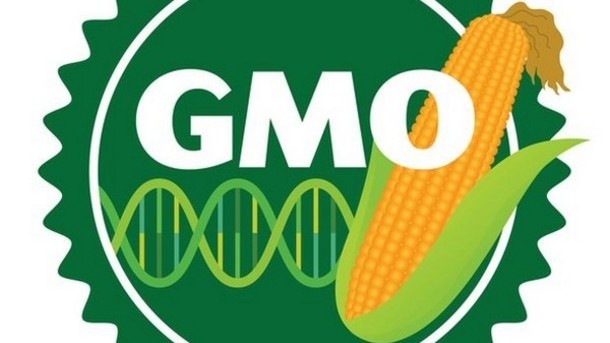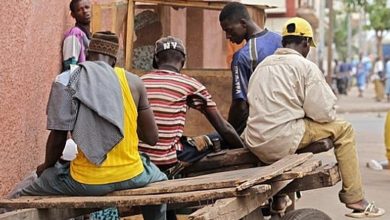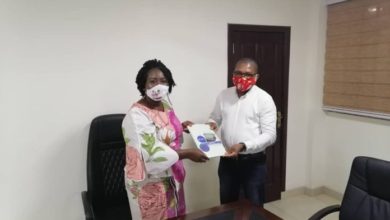GMO dialogue: Ghana risks violating patent rights – Nyaaba

Ghana risks violating patent rights in its quest to produce genetically modified organisms; the fallouts – the country risks paying heavy fines to the rights holders if it embarked on this discourse, Director of Programmes at the Peasant Farmers Association of Ghana has cautioned.
Mr. Charles Nyaaba said companies hold patent rights for seeds and can sue entities who produce such seeds without the required rights.
“Since gmo seeds are patented by a company and then if you don’t have the right to produce gmo seeds and then you go to produce it that company can sue you and then be made to pay some fines so it’s another strategy to control the way we grow seeds in the country and that will have a long run implication on our food sovereignty,” said Charles Nyaaba.
Mr. Nyaaba’s call comes in the wake of several calls for a national dialogue by the chairman of the National Farmers and Fishermen Award Winners Association of Ghana, NFFAWAG, Davies Narh Korboe, on various platforms and mediums.
As a nation, these issues are very important to us and we think that for any decision to introduce gmos into the country, we need to actually have a national dialogue to understand whether stakeholders are supporting gmos or not, Mr. Nyaaba asserted.
The Director of Programmes at the Peasant Farmers Association of Ghana said calls for a national dialogue to discuss the pros and cons of adopting the controversial gmo technology were in the right place.
Mr. Nyaaba, an avowed critic of the gmo technology in describing the call for a national dialogue as being in the right direction said one of the first calls from proponents of the gmo technology should have been the need for a national dialogue.
“The call for a national dialogue is in the right direction and I think that is the first thing that should have come to whoever is proposing to come to the country before even thinking of implementing gmos,” he stated.
“We as farmers are keeping quiet because they think that they can just bring anything and impose on farmers but I’m telling you when they bring farmers here it won’t fly,” Mr. Nyaaba fumed adding that the association will sensitize farmers to reject the technology if it was ever imposed on local farmers.
“We’ll make sure that we sensitize our farmers to hold on to seeds that are produced by seed researchers, seeds that are produced by our own seed growers and then we’ll make sure that we work closely with our local seed growers not to take them because it’s not going to help anybody.”
According to the EU, a Genetically Modified Organism is any organism, with the exception of human beings, in which the genetic material has been altered in a way that does not occur naturally by mating and/or natural recombination.
Celebrated Ghanaian farmer and 2009 national best farmer, Davies Narh Korboe who has widely expressed his love for GMO has persistently called for a national dialogue on the GMO technology in Ghana.
Farmer Davies, as he’s known maintains that the technology, though widely despised in the country, is already in the country anyway and can help boost food production if adopted.
Ghana’s 2009 national best farmer, a staunch advocate of the food production technology who has seized every opportunity to preach what he says are the virtues of GMOs, has urged farmers to adopt the technology as a means to enhance food security and sustainability.
He is known for his staunch advocacy for GMOs and has a message for those advocating against its adoption: GMOs are safe.
There is universal agreement that the world’s population is increasing at an alarming rate especially in developing countries and this poses a major threat to food security. The United Nations projects that world population will increase by 25% to 7.5 billion by 2020.
Climate change is likely to worsen available food supplies which may lead to malnutrition and other serious health problems.
To address these concerns, Genetically Modified Organisms (GMOs) have been introduced to improve food production.
Genetically Modified (GM) products include medicines and vaccines, foods and food ingredients, feeds, and fibers.
In Ghana, the Biosafety Act (2011), Act 831, was passed to establish the National Biosafety Authority with the objective of, inter alia, “to ensure an adequate level of protection in the field of safe development, transfer, handling and use of genetically modified organisms resulting from biotechnology that may have an adverse effect on health and the environment”.
Source: ritefmonline.org




Mr. Nyaba is just throwing dust in the eyes of the right thinking ghanaian who has the right to do and make his or her choice as to what he or she wants to grow or eat. He has rightly said thr newly improved seeds will not be imposed on any farmer. That is right so why is he complaining becuase no one has said the seeds will be imposed on anyone including himselg. If he understand his own statement then why will he take donors money which could be used to developed improved seeds locally to fight the technology and force farmers to reject the technology. He is an abuser of the right of the poor farmer. He is taking advantage of these farmers on whose back he feeds himself and families. He and people in his category are a threat to humaity and if we allow them they will sit on peoples right and will never support democracy. They are dictators and oppressers. Watch these ones carefully. I fear them.